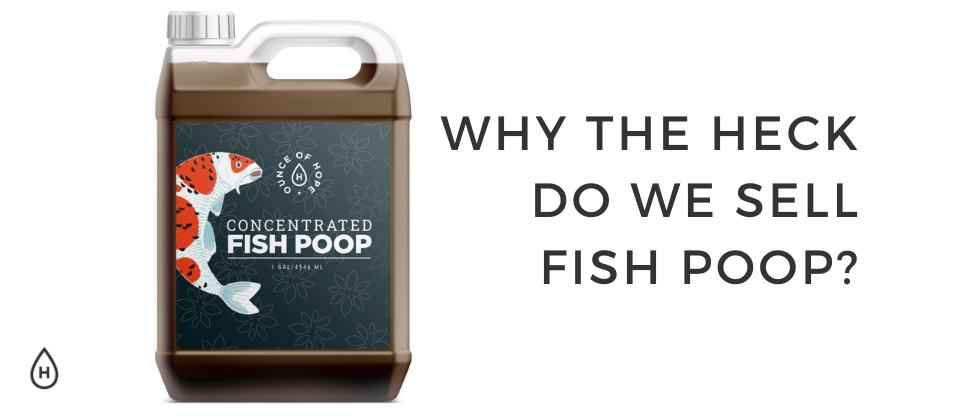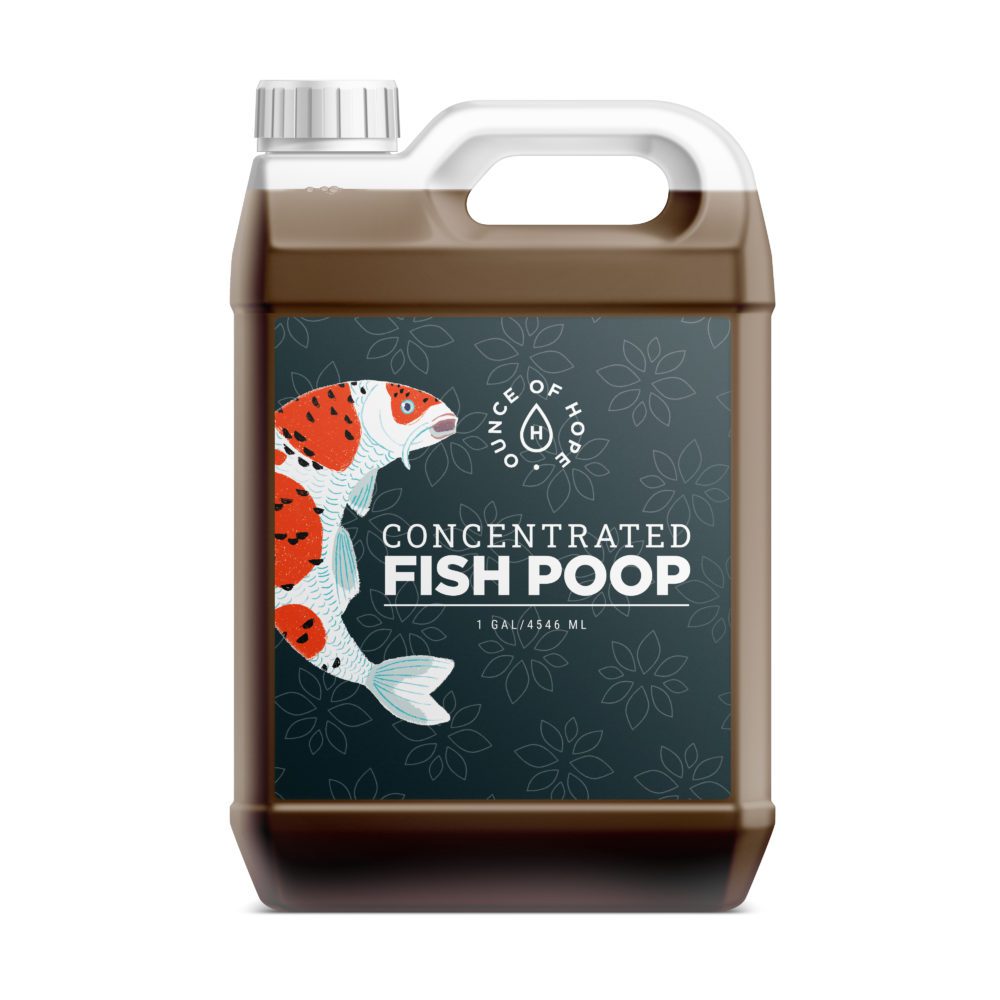You may or may not have noticed one of the products to grace our lineup: concentrated fish poop. And no, it’s not a new dank strain name. It’s not for human consumption, at all. So — why the heck do we sell fish poop?
In our guide today, we want to go over all the beautiful benefits of concentrated fish poop.
Find out why we sell fish poop, and why you might even be interested in buying the stuff one day. Let’s dig in.
Is it Real Fish Poop?
This is, understandably, a reasonable first question you might have. Is our concentrated fish poop real fish poop? The short answer is a defining yes. This is actual, real fish poop. The name of our product isn’t just a funny quip! Our fish poop is produced on-site at our Ounce of Hope Aquaponics Cannabis Farm in Memphis, Tennessee.
The raw fish poop is not only a side effect of our hemp-growing process, but one of the most integral aspects of our eco-friendly farming practice. At Ounce of Hope, we utilize an aquaponic growing system. The environment we create houses a closed system of fish habitation and plant growth in a rather consistent loop.
Fish poop is the result of this efficient system producing excess fish material. When it produces excess, we can harvest, concentrate, and bottle it up for use in other farming setups.
Even non-aquaponic farms can benefit drastically from this stuff! It acts like an amped-up fertilizer, giving plants the quality treatment.
How Does an Aquaponics System Work?
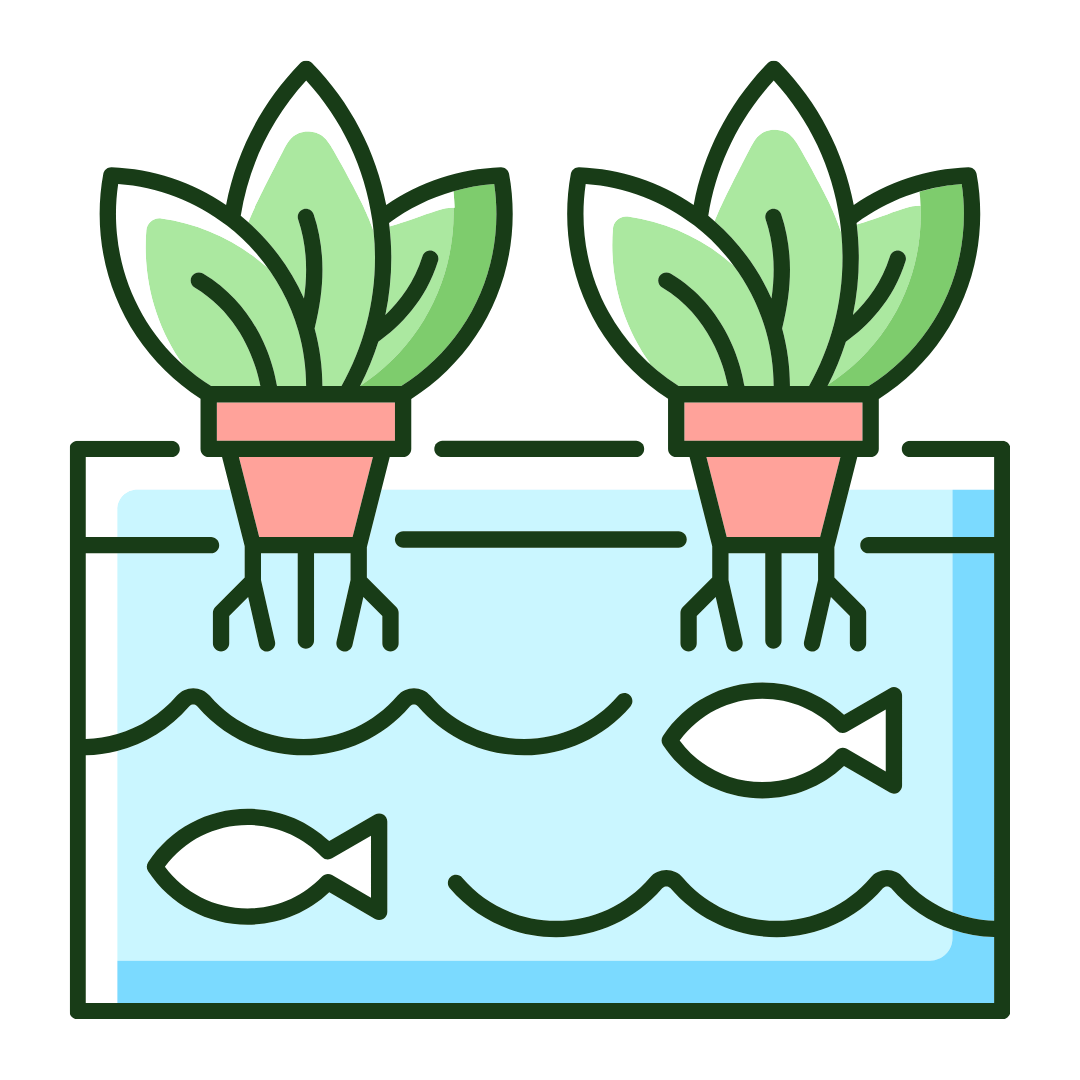 The concept of aquaponics has actually been in practice since around 1000 AD.
The concept of aquaponics has actually been in practice since around 1000 AD.
Ancient Aztec farmers would raise plants on rafts on the surface of lakes when available. This provided the old world with an extremely renewable form of farming that didn’t require moving crops to new fields. It also eliminated the need for controlled burns to give nutrients to old soil.
This has also been in practice in East Asia as well. Rice in paddy fields has been grown using a similar system since the 6th century. Their system involved ducks, fish, nitrifying bacteria and, of course, rice.
Aquaponics relies on a tiered system that ultimately benefits each section involved. In modern aquaponics, the fish are raised in tanks.
These tanks are then lined with plants that feed on the fish waste using a soilless hydroponic setup.
The plants, in turn, clean the water for the fish providing a balanced habitat for both.
This process is a smaller, more contained biome that mimics the natural life balance found in natural bodies of water.
The nature of an aquaponic system ensures that harsh pesticides and herbicides are never used. This would harm the fish and destroy the environment they’ve cultivated. Aquaponic systems are organic, safe, and renewable options for both fish and plant production.
Doesn’t the Aquaponic System Need the Fish Poop?
 You bet it does — but not all of it.
You bet it does — but not all of it.
When an aquaponic system is in tanks and a completely closed circuit, the fish tend to overproduce waste. This is still the same plant feeding nutrient-dense fertilizer, but in excess.
The fish poop then gets separated, concentrated, and stored for use in non-aquaponic farm operations of all sizes. So, in addition to providing an absolutely pristine form of farming, aquaponic systems create excess value simply by operating.
And thus, the ability to sell fish poop to those looking for a safer, more nutrient-dense, and organic fertilizer. For small-scale operations like home gardens all the way up to big-league farms, plants love fish poop.
Our aquaponic system at Ounce of Hope houses koi and tilapia fish, both of which thrive in aquaponic conditions. Koi is an ornamental family of carp, while tilapia are a robust, capable breed. When they work together in harmony, a closed ecosystem can be as efficient as possible without sacrificing any quality.
The fish in question are so well suited for this type of biome that their contributions run above and beyond what is needed for the hemp itself. Again, that’s without sacrificing quality. It also doesn’t require additional conditioning or climate control.
With so much excess poop, we found ourselves with a unique opportunity. Now, we’re able to donate portions of our fish waste to local gardens and farms all across our Memphis community! We’re always trying to support local small-scale cultivation with fantastically nutrient-dense fertilizer.
Selling concentrated fish poop on our online shop opens our ability to help this small-scale cultivation on a national level! Our goal is to help as many communities as possible across the country with our supercharged fertilizer.
So, Why Do We Sell Fish Poop?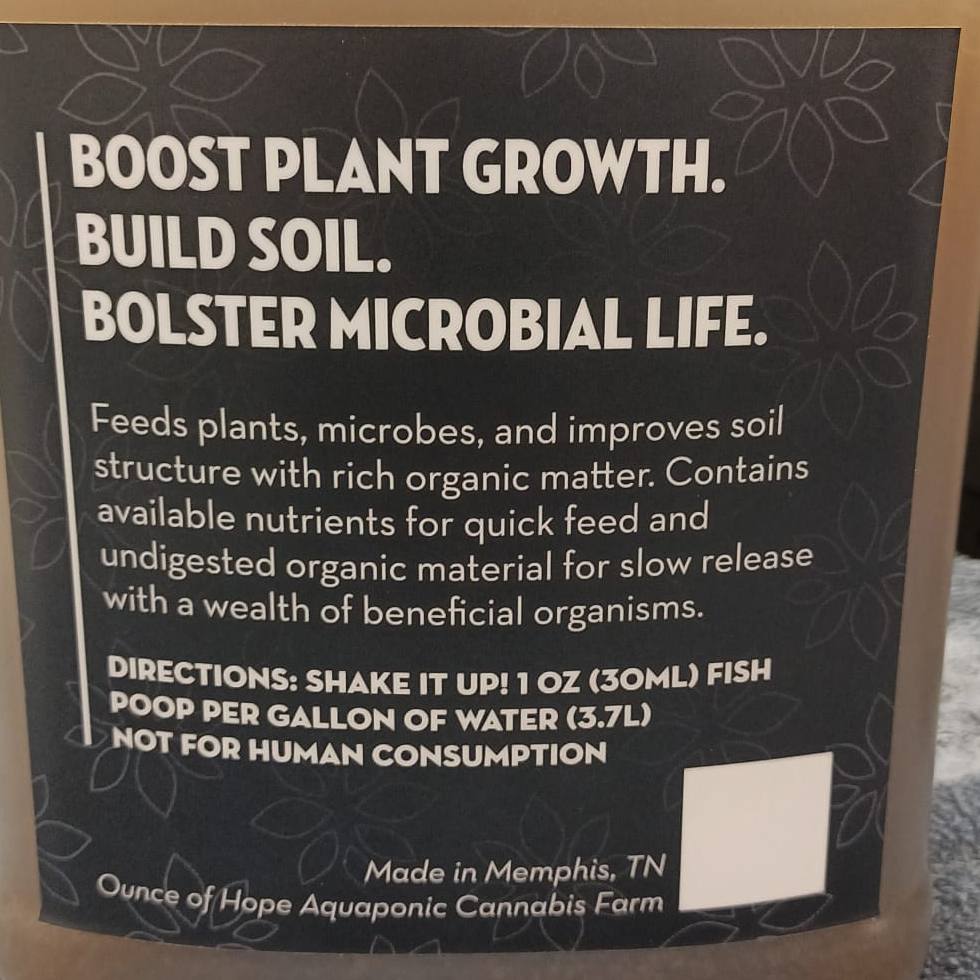
When you have as much fish waste as we do, there are plenty of reasons you’d sell fish poop, too. The value of fish poop has been severely doubted for a long time — but this isn’t the case anymore.
Animal waste as fertilizer is already a well-known established practice, but not all poop is created equally.
The most prevalent manure in farming and gardening is harvested from land-based animals. The top contributors are as follows:
- Chicken
- Cow
- Horse
- Sheep
- Goat
- Pig
Now the manure used in and of itself is not the problem.
The amount of resources necessary to produce it is daunting, however.
These large groups of animals require an astonishing amount of water, food, land, and other resources to fuel their diets. Without all these valuable resources, these animals can’t produce nutrient-rich waste to grow even more food.
And then there’s fish waste — in a more valuable, albeit stinky, league of its own.
It’s a More Efficient Type of Manure
Even outside of the resources necessary to produce livestock manure, the usability is vastly different. Land-animal-based manure can take months to break down and allow the nutrients within to be used by crops. Fish manure is much faster-acting and provides nutrients into soil quicker and more efficiently.
This means your plant is growing stronger and faster with no need to struggle against the clock of decomposition to slowly release vital nutrients.
Since an aquaponics system is relatively sustainable on its own, the production of crops and fish together are devoid of any and all harmful additives. All we have to do is feed the fish!
(That’s not all we have to do, but it’s a good simplified idea of it.)
Furthermore, the fish aren’t exposed to outside fertilizers or pesticides, so the crops stay organic.
On that same note, no antibiotics are added to the fish diets because it could severely harm the crops.
This symbiotic relationship means that the fish poop is free of chemicals and contaminants and provides an extremely clean fertilizer!
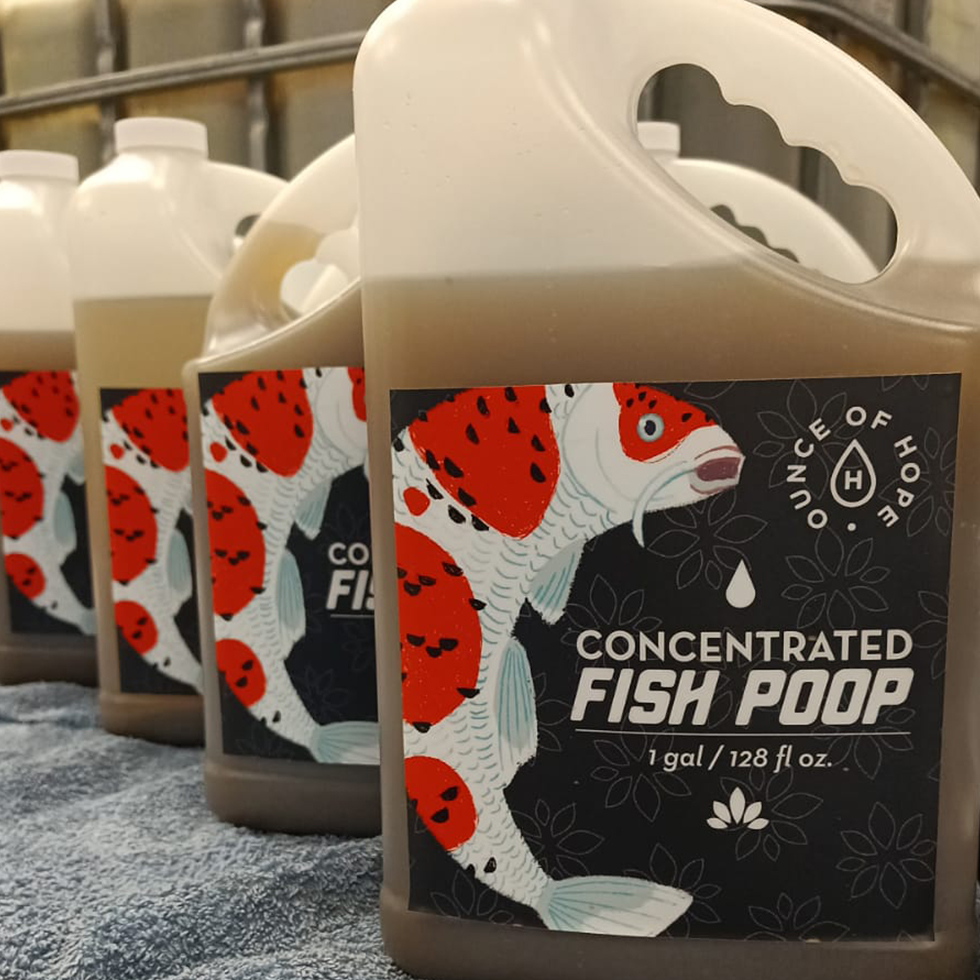 Fish Poop is a Hyper-Nutritious Fertilizer
Fish Poop is a Hyper-Nutritious Fertilizer
The fish poop we sell isn’t just convenient — it’s powerful! Fish manure has the potential to contain:
-
- Nitrogen
- Phosphorus
- Potassium
- Calcium
- Magnesium
Combined, this is a recipe for nutrition. When coupled with its fast-acting breakdown, it can increase the crop growth of an aquaponics operation by up to 25%.
It’s much like how proper nutrition helps people grow big and strong. Fish poop acts as the powerhouse for plants to be their best.
Naturally Produced from Fish
This is a convenient but also an important aspect as to why we sell fish poop. Our Ounce of Hope aquaponics farm is a closed-circuit, bio-organic operation. It relies on waste as an integral component to continue functioning. Fish poop is not only a side effect, but also simply a necessity.
The fish poop produced in an aquaponics farm is by nature completely organic and free of additives. Manure is produced and utilized in one fluid motion and is as clean as a plant food gets.
This protects crops from harmful antibiotics and steroids. Unfortunately, these steroids and antibiotics are found in mass-produced livestock manure from feed animals such as cows and chickens.
Often these medical additives are still found in manure and can dramatically impact a crop it may be used on. In many cases, you diminish the quality of life for the plant. Likewise, plants grown with lesser-quality manure may not reach their full plant potential.
We Had Extra!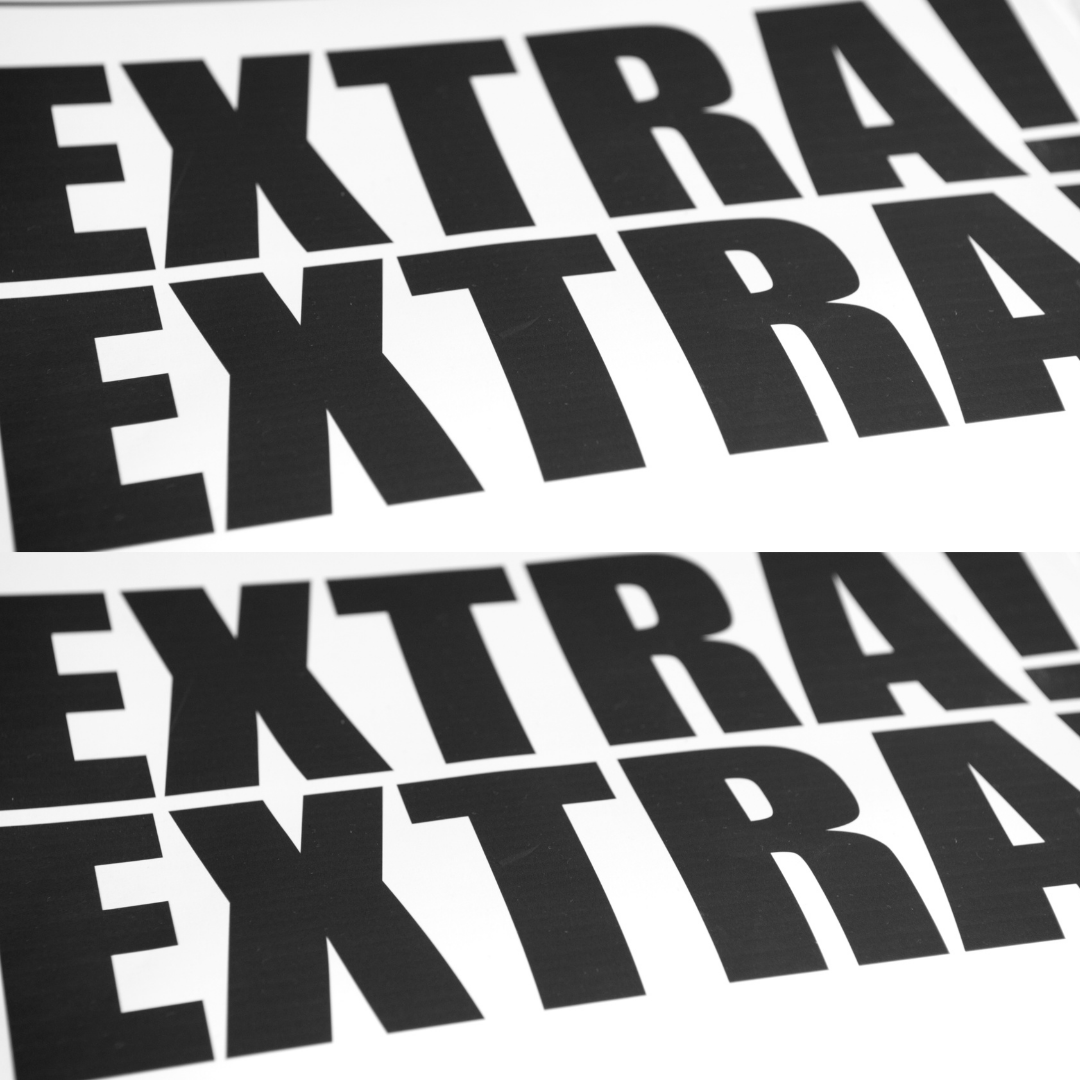
Like we mentioned, our aquaponics farm produces a LOT of fish poop. The crops that work in tandem with the fish enclosures can only use so much at any given time.
This gives us an excess of fertilizer. It’s already being separated and removed from our own grow process. That ensures our whole system can continue to run efficiently and clean.
And since the fish never stop producing, something has to be done with the excess. We love to donate this amazing, garden-boosting fertilizer to local small-scale farms and home gardens. But the reach for direct contribution can only extend locally so far for us.
Instead of letting this amazing plant fuel go to waste (pun intended), we were left with a decision. We made sure we could spread our fish poop far and wide! Our goal is for as many people as possible to enjoy the benefits that this amplified fertilizer has to offer.
Wrapping Up: Why We Sell Fish Poop
At Ounce of Hope, quality comes first. From the products we offer, to how we grow them, every step of the way needs to be our best. At the end of the day that includes giving our customers the ability to grow their own plants.
In conclusion, fish poop is a nutritious, fast-acting fertilizer that is both safe and effective. It may be something your garden or plants have been waiting for.
Maybe it’s time to invest in your own fish poop to start that garden you’ve been talking about. Or perhaps that small grow site you’ve been thinking of can finally come to fruition. Whatever your gardening goals, fish poop can make them happen!
